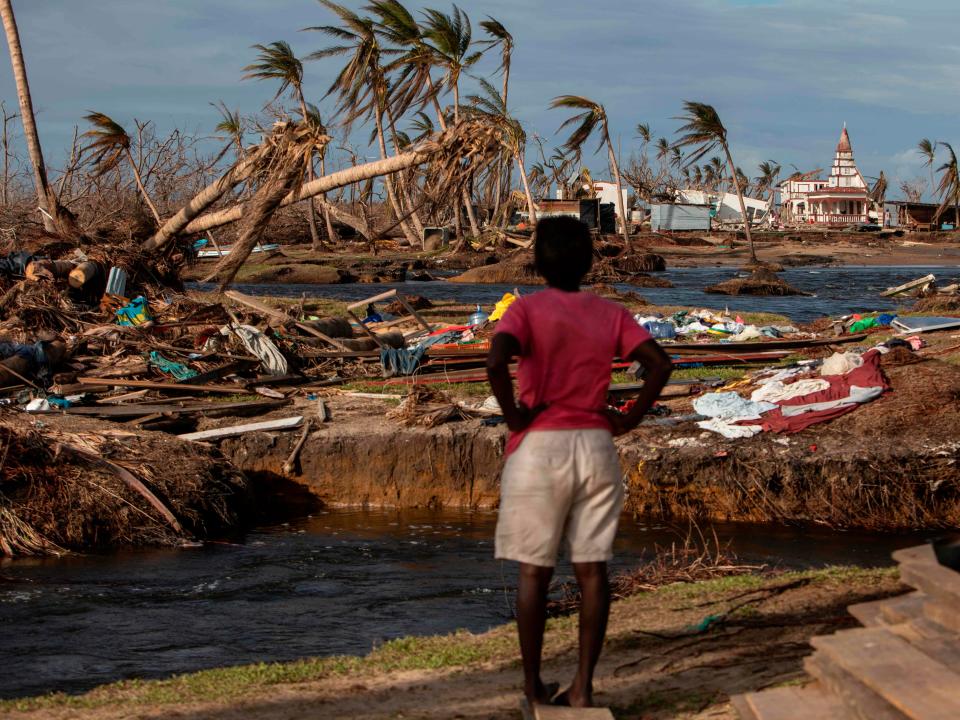2020 among three hottest years on record, says UN’s science agency

The aftermath: damage wrought by Hurricanes Eta and Iota in Nicaragua in November last year
(AFP via Getty Images)The year 2020 – which saw prolonged heat in the Arctic and the busiest Atlantic hurricane season ever – was among the three hottest on record, according to data from the UN's World Meteorological Organization (WMO).
The analysis, which draws on five global temperature datasets, also finds that the period 2011-2020 was the hottest decade on record, and that the six warmest years have all occurred since 2015.
There is little temperature difference between the top three years, which are 2016, 2019 and 2020, according to the WMO.
In 2020, average temperatures were around 1.2C above levels seen before the start of the industrial era, the analysis finds.
Antonio Guterres, the UN’s secretary-general, said in a statement: “The confirmation by the World Meteorological Organization that 2020 was one of the warmest years on record is yet another stark reminder of the relentless pace of climate change, which is destroying lives and livelihoods across our planet.
“Today, we are at 1.2C of warming and already witnessing unprecedented weather extremes in every region and on every continent.
“Making peace with nature is the defining task of the 21st century. It must be the top priority for everyone, everywhere.”
The year 2020 was among the hottest despite being a modest La Nina year, said Prof Petteri Taalas, the secretary-general of the WMO. El Nino and La Nina are natural periodic weather events that are part of an irregular inter-annual cycle called the Enso cycle.
Global temperatures are typically hotter than average in El Nino years and cooler than average in La Nina years. However, the impact of these natural events on global temperatures is increasingly being overwhelmed by the long-term heating trend caused by rising greenhouse gas emissions, scientists say.
“The exceptional heat of 2020 is despite a La Nina event, which has a temporary cooling effect,” said Prof Taalas.
“It is remarkable that temperatures in 2020 were virtually on a par with 2016, when we saw one of the strongest El Nino warming events on record. This is a clear indication that the global signal from human-induced climate change is now as powerful as the force of nature.”

The WMO’s analysis draws on data from Nasa, the US National Oceanic and Atmospheric Administration (NOAA), the EU’s Copernicus Climate Change Service, the Japan Meteorological Agency (JMA) and a team of UK research groups led by the Met Office.
Nasa and the Copernicus Climate Change Service, which first released its temperature results last week, estimate that 2020 is tied with 2016 as the hottest on record. (In Nasa’s dataset, 2020 is just ahead of 2016.)
NOAA and the team led by the Met Office, meanwhile, estimate that 2020 is the second hottest year on record behind 2016. And Japan’s meteorological service finds that 2020 is the third hottest year.
The reason why research groups tend to come up with different estimates is related to the methods used to calculate temperature change, Dr Zeke Hausfather, a climate scientist and director of climate and energy at the Breakthrough Institute in California, previously told The Independent.
“The difference between the groups is mostly to do with how they fill in the ‘gaps’ in the Arctic,” he said.
There are gaps in our knowledge of daily temperatures in some of the most remote parts of the Arctic Ocean as a result of there being no weather stations in these locations.
Research organisations account for this in slightly different ways, leading to small differences in their global temperature datasets, said Dr Hausfather.
The findings will be incorporated into the WMO’s State of the Climate in 2020 report, which is due to be published in March.
Read More
Rising temperatures linked to poorer diets for children, says study

 Yahoo Finance
Yahoo Finance 